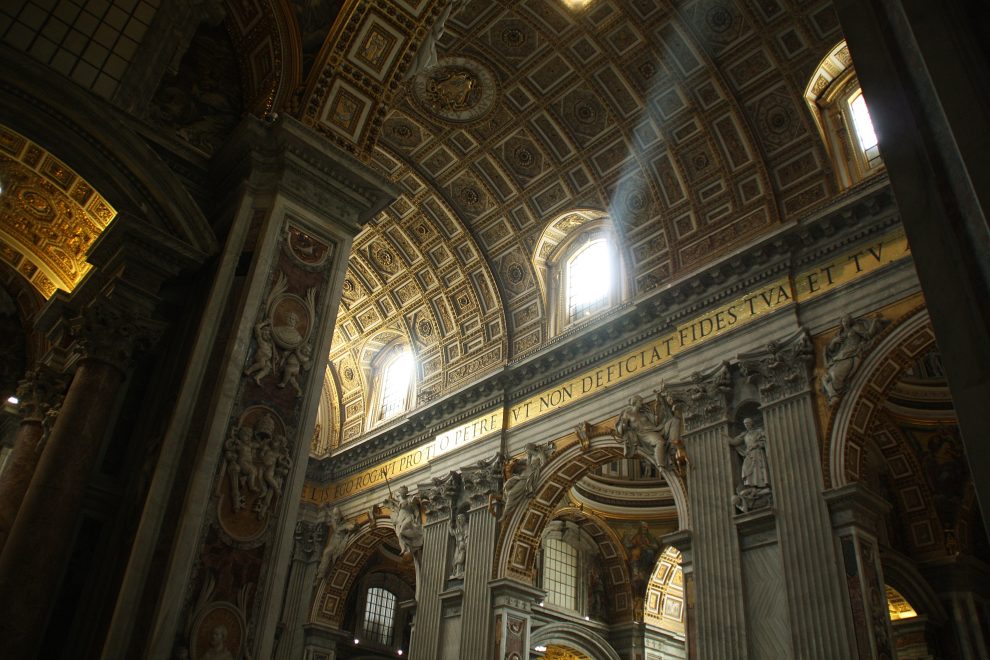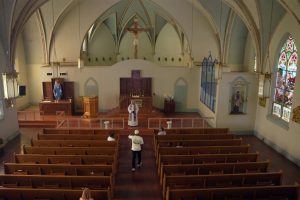Vatican II still looks “fabulous at 50” to U.S. Catholic readers, who say the golden years are no time to retire its reforms.
Web exclusive: Readers sound off on the best and worst of Vatican II
Neither fans nor critics of U.S. Catholic should be surprised that its readers love Vatican II. When the magazine surveyed readers about the Second Vatican Council in 2005—to mark the 40th anniversary of its closing—91 percent said the church was a better place because of it. And at the 50th anniversary of its opening, three-quarters call it “the best thing that’s happened to the church in centuries.”
But a few things have changed since 2005, the year that Pope Benedict XVI took the reins of the church. Changes to the liturgy, an attempt to repair the schism with the Vatican II-rejecting Society of St. Pius X, steps back from ecumenical and interfaith relations, and, most recently, the Vatican action against the Leadership Conference of Women Religious have caused concern for readers, with a strong majority feeling that the church has started moving away from the reforms enacted by the council. While lauding the efforts of the council to bring the church into conversation with the modern world in the 1960s, many express a concern for the future.
There are many social, liturgical, and sexual issues that readers hoped the council would have addressed, but according to Judy Lovett of Dover, Delaware, the most important missing element was “somehow making sure the reforms were not rolled back.”
“I know that’s impossible, but I can wish!” she adds, echoing the sentiments of many readers.
Another significant change since 2005 is the way U.S. Catholic conducts its reader surveys. Once collected only through questionnaires mailed to subscribers, the admittedly unscientific survey is now open to anyone who wishes to respond at uscatholic.org. More than 2,000 Catholics took the survey, about 350 of whom are subscribers to the magazine. Many responses, however, came after conservative Catholic bloggers encouraged their readers to complete the survey.
When non-subscribers are included, the number who think Vatican II is “the best thing that’s happened to the church in centuries” dips from 74 percent to 37 percent. Among subscribers, 81 percent think the church needs to go farther or get back on track with the reforms. But among all respondents, 52 percent say the church went too far. (Click here to see the full results including all 2,084 survey respondents.)
The divide among respondents reflects a growing polarity in the church—one that was predicted and feared by U.S. Catholic readers in 2005. But both groups share a knowledge of and passion for the church. Eighty-six percent of subscribers and website visitors have read at least one document from Vatican II. Only a handful of respondents said Vatican II was “ancient history” or had no opinion of it.
The primary concern of all survey-takers is how the changes were implemented. “The problem is not so much what it failed to address but that much of what was said never happened,” says a reader from Dartmouth, Massachusetts. Daniel Marsh of Arlington, Virginia counters with the argument expressed by some respondents that the church went beyond what the council called for in its reforms. “Most of the changes are the unintended consequences of a horrifically botched implementation,” he says.
People like Marsh expressed concern that the church would lose its identity and tradition in modern society. Some subscribers also regret lost traditions, like Gregorian chant and other “smells and bells,” but only a few raised such issues. The church may have lost “some of its mysteriousness, but should it have been mysterious to begin with?” asks Barbara Reder.
Katherine DeBacker of Highlands Ranch, Colorado says Catholics have lost “the ‘pray, pay, and obey’ mentality, as more have become educated in scripture and theology and are choosing to act as responsible Christian disciples—and this is good!”
Subscribers almost unanimously agree that they would undo nothing about Vatican II. Rick Ehrlich of Hartford, Wisconsin says that “a more defined vision of where the church should be headed in today’s world” would have helped prevent what he perceives as the current undoing of the council’s efforts.
Even if they wouldn’t change anything about the council, subscribers say there’s still plenty of work for the church to do 50 years later. Sexual ethics top many people’s list of unresolved issues. The church’s opposition to contraception and married priests continues to vex many respondents.
The role of women in the church has greatly expanded thanks in part to Vatican II, but not far enough according to many subscribers. Some would like to see women’s ordination at least discussed and are unhappy with recent trends such as parishes eliminating female altar servers.
Many also expressed concern with the church’s hierarchical structure. The church has lost “any sense of collegiality or subsidiarity,” says Lawrence Mick of Dayton, Ohio. “All power has been reclaimed by the Vatican in defiance of the council’s decrees.”
Subscribers are split on whether the church needs a Third Vatican Council today, but some believe it could lead to more decision-making at the local level. “The sex abuse scandal should be more than enough impetus for this focus,” says Margaret Fortier of Pomona, New York.
“The ambition, power, prestige, and wealth in the hierarchy are inappropriate and counterproductive to the spreading of the Good News of Jesus Christ,” says Carol Crawford of Wexford, Pennsylvania. “We need an overhaul at the top.”
Subscribers also acknowledge the ways Vatican II has affected their own lives, particularly when it comes to the increased lay involvement in the church. “For the first time I felt ‘the people’ were the church, not just the hierarchy,” says Laurie Pascutti of Stevens Point, Wisconsin.
Teresa Burns credits the council with allowing her to become a lay minister. “I would have had to be a nun to have an active role in parish leadership,” says the Grand Rapids, Michigan resident.
Many also credit the council with helping them to enhance their spiritual lives. Despite complaints from some respondents that Vatican II lessened the church’s sense of mystery and transcendence, 89 percent of subscribers say that it had a positive effect on their own faith lives.
The church of his childhood was “ritualistic, distant, meaningless, and power-filled,” says Robert L. Funaro of Ada, Michigan. But Vatican II “increased my spirituality in an equitable, honest, and free-spirited kind of environment,” he says.
Many readers credit a deeper understanding of and participation in liturgy and scripture for their renewed spirituality. “My own study and immersion in scripture have brought Jesus to life and have provided an ecumenical connection that I did not have before,” writes Biagio Mazza of Kansas City, Missouri. “Scripture has brought the church back to life and strengthened it.”
Gretta Barnes of Petersburg, Virginia is one of a handful of respondents who say they joined the church in large part because of the council. “I’ll never forget the first time I heard the preface of Gaudium et Spes at an RCIA session,” she writes, quoting from it: “The joys and hopes, the griefs and anxieties of the women and men of our time, especially of those who are poor or afflicted in any way, are the joys and hopes, the griefs and anxieties of the followers of Christ as well.”
“After I heard those words, I was convinced that I had to become a Catholic,” Barnes says.
Vatican II has also kept cradle Catholics in the church. If it hadn’t happened, the church would be “less one member—me,” Alvera M. Sams of Findlay, Ohio says. She’s not the only one. Many others also responded that the church would be “without me.”
Even some conservative Catholics agree that without Vatican II the church would be smaller than it is today. John Boyles of Texas isn’t sure that would be bad, writing that the church would be a “close-knit family, but a smaller family.”
But a smaller church doesn’t appeal to most subscribers. Without Vatican II the church would be “in the dark ages,” “a quaint sect,” or “a fossil,” some say. Robert Dueweke of El Paso, Texas says it’d be “a relic that belongs in a museum for the curious.” Others use medical terms like “deeply wounded,” “comatose,” or just plain “dead.”
But even without Vatican II, Kevin Wilkinson of Durham, North Carolina thinks the church would continue to survive. “The reforms helped the church converse with the modern age, but it was not a life or death situation,” he says. “The church will be with us until the end of time.”
“And the survey says…”
1. When Vatican II opened, I was:
44% – In high school or college.
27% – An adult.
22% – Too young to be aware of what was going on.
7% – Not born yet.
2. The reforms of Vatican II have had a positive effect on my own faith life.
89% – Agree
7% – Disagree
4% – Other
3. The area of church life where Vatican II has had the most effect on me personally is:
48% – The involvement of laypeople.
26% – The Mass.
6% – Ecumenical and interfaith relations.
6% – The church’s social outreach.
5% – Scripture study.
9% – Other
4. I have read at least one of the documents from Vatican II.
86% – Agree
9% – Disagree
5% – Other
5. Sometimes I wish the church could go back to the way it was before Vatican II.
8% – Agree
89% – Disagree
3% – Other
6. It is about time that the church held another ecumenical council.
50% – Agree
30% – Disagree
20% – Other
Representative of “other”:
“I don’t know that we need a new council as much as a recommitment to and a reexamination of Vatican II.”
7. When looking at the implementation of the reforms and renewals that Vatican II called for, I’d say:
55% – The church was on the right track for a while but has lost its way in recent years.
26% – The church has not gone far enough toward what Vatican II called for.
6% – The church went too far and needs to restore more pre-Vatican II practices.
5% – The church has done a good job.
5% – The church went beyond what the council called for but is now starting to fix some of those mistakes.
3% – Other
8. It feels like the church has started moving away from or even rolling back some of the reforms of Vatican II.
87% – Agree
9% – Disagree
4% – Other
Responses are based on the answers of 355 U.S. Catholic print subscribers. To see the results from all 2,084 respondents, click here.
This article appeared in the October 2012 issue of U.S. Catholic (Vol. 77, No. 10, pages 23-27).
Image: Luis Núñez via Pexels














Add comment